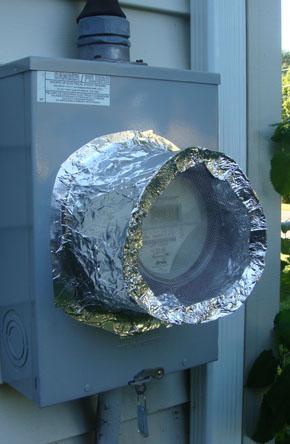 When Kevin O’Brien answered a knock at his door on November 7, he didn’t expect to be facing a state trooper.
When Kevin O’Brien answered a knock at his door on November 7, he didn’t expect to be facing a state trooper.
O’Brien, a textile designer living in Wittenberg with Myoshin Thurman and their two children, aged 5 and 2 years, listened to the trooper explain that he was there to escort a Central Hudson employee who had come to replace their analog electric meter with a new digital model. “I asked if we had an alternative? Could the old meter be replaced with another of the same model?” O’Brien recalled and said that he was told the old analog meters were no longer available.
When presented with an inquiry about the legal basis, civil or criminal, of the police escort, a N.Y. State Police dispatcher, after several computer searches, could find no record of the incident. Central Hudson spokesman, John Maserjian, however, supplied a ready answer to that question.
“There are some residents who place barricades on their meters. That is illegal,” Maserjian said before later sending a section of Utility Law which did not appear to exactly support this claim. “Any barricade placed on a meter is very dangerous because it blocks our employees from access to disconnect power in the event of, say, a fire or some other emergency situation.” Asked if power could be shut off remotely, he replied, “No. Not yet.”
The “not yet” refers to a still pending Public Service Commission decision on whether to permit the deployment of “smart meters” in New York State, which would allow the utility to disconnect meters remotely, as well as receive a two-way feedback from ratepayers, which would then officially fall under the industry’s definition of “smart.” The meters currently being deployed in a test pilot program, Maserjian points out, lack that two-way capacity.
Utilities have also been backing away from the “smart meter” title because of its negative usage by numerous groups which have sprung up in recent years to resist the roll-out of the multi-faceted meters. Opposition from these groups, based on concerns about harmful health effects from radiations emitted by the devices, privacy violations and other issues, are perceived by pro-industry sources to have given the very term “smart meter” something of a black eye. Opponents commonly use “smart meter” in reference to any meter transmitting microwave radiation, two-ways or not.
Grassroot “Stop Smart Meters” organizations have proliferated around the world, spawning websites like a “bare bones” one in Woodstock added this week at
stopsmartmeterswoodstockny.com which will soon be adding content. Others offer advice to ratepayers on topics such as how to protect old analog meters that have functioned well for generations, by building a lockbox or cage around it so it can still be read but can’t easily be replaced with a digital meter. Utilities operate on an assumption of “implied consent,” which generally means that if a customer has not notified the utility that the “improvement” was not wanted, it will automatically be installed. Critics of this policy argue that ratepayers cannot object to something about which they have not been informed. This argument was advanced by Myo Thurman in September when a Central Hudson meter installer came to change the meter. Politely explaining that she did not want the meter because she was very concerned about its possible health effects, she said he declared “You’ve won the lottery! You’re part of a pilot program!” and that the meter was absolutely inactive and powered by a ‘double A’ battery.”
Read more at
No comments:
Post a Comment